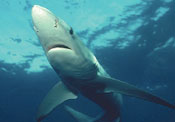EU must lead to protect Mediterranean sharks
New scientific paper describes unparalleled population depletion as EU grapples with shark conservation proposals

The Shark Alliance is calling on European Member States and the European Commission to address the dramatic depletion of sharks in the Mediterranean Sea documented in a new scientific analysis, Shark Declines in the Mediterranean Sea: A Summary of New Scientific Analysis, published in the journal Conservation Biology.
There are currently no Mediterranean catch limits for the shark species reported in the paper to have suffered regional population declines of 97-99% (hammerheads, threshers, porbeagles, makos and blue sharks), but the European Union and its Member States have ample opportunity to improve the situation through a variety of national, regional and international initiatives.
"Time is running out to fix the horrendous record for shark conservation in the Mediterranean," said Sonja Fordham, Shark Alliance Policy Director. "The results of this paper underscore previous conclusions by the IUCN that the Mediterranean Sea is one of the most dangerous places on earth for sharks. It is incumbent upon the European Union to use the tools at its disposal to lead the region toward conservation of these highly threatened animals before it's too late."
Great white and basking sharks are the only shark species protected in the Mediterranean and those safeguards apply only to Croatian and European Community waters. Fishing for all other Mediterranean sharks remains unregulated. "Finning" (slicing off a shark's fins and discarding the body at sea) is prohibited throughout the Mediterranean, but enforcement methods are lenient.
The tools to remedy Mediterranean shark depletion are numerous yet so far under-utilised. The European Commission is currently developing a comprehensive Plan of Action for Sharks that can set the stage for widespread improvements in EU shark policies, including science based catch limits and a stronger finning ban. The Commission expects to complete the plan by December 2008 for consideration by the EU Council of Ministers.
In the meantime, EU Member States can enact national rules to protect sharks and should now be proposing shark species for listing under the Convention on Migratory Species (the path that led to Mediterranean protections for white and basking sharks) at the December Conference of the Parties in Rome. The European Commission and Member States can work together to develop shark conservation proposals for the regional fisheries bodies that guide and mandate fishing restrictions in the Mediterranean.
"Never before have the EU's Mediterranean countries had more reason or opportunity to begin safeguarding the region's beleaguered sharks," said Fordham. "Fisheries and Environment Ministers should heed the dire warnings in this paper and act immediately to conserve depleted shark species through national protection, a comprehensive Community Plan of Action for Sharks, and proposals to international fisheries and wildlife bodies. Such action is necessary to change the current course toward extinction of these remarkable predators."
Notes to editors:
Conservation Biology paper
The study was funded in part by the Lenfest Ocean Program. The Lenfest Ocean Program supports scientific research aimed at forging new solutions to the challenges facing the global marine environment. The program was established in 2004 by the Lenfest Foundation and is managed by the Pew Environment Group.
For more information about the program, please visit www.lenfestocean.org
Detailed information on all Mediterranean shark and ray species can be found in the 2007 IUCN Publication: Overview of the Conservation Status of Cartilaginous Fishes in the Mediterranean Sea (PDF).


America’s Overdose Crisis
Sign up for our five-email course explaining the overdose crisis in America, the state of treatment access, and ways to improve care
Sign up








